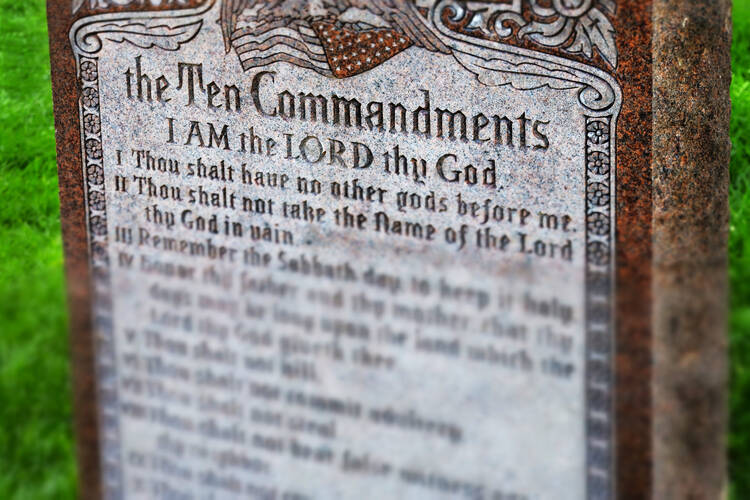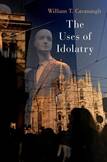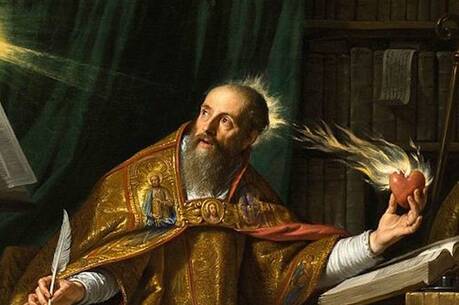Tearing down idols: William Cavanaugh’s theology is a must-read for the modern West
This essay is a Cover Story selection, a weekly feature highlighting the top picks from the editors of America Media.
How ought we describe our times? Which words can help us imagine the shape of our social world? Under what terms ought we to think about the dilemmas of our age?
Despite their depth and importance, answers to questions like these are more or less a dime a dozen. After the collapse of the Soviet Union, for example, Francis Fukuyama informed us that we were living at the End of History. It was Jean Francois Lyotard’s fabled “Report on Knowledge” through which a generation of college students learned that theirs was a Post-Modern Condition. In an attempt to capture the overwhelming impact made by human beings on the biodiversity of the planet, ecologists have begun describing our age as the Anthropocene. Even Pope Francis, in his efforts to reform the Vatican curia and resist theological nostalgia, has insisted that we are living through not “an era of change, but a change of era.”
Despite this proliferation of names, though, perhaps the most common title for our times is secular. Ours is, so the story goes, a secular age. In its usual telling, it goes something like this: Once upon a time we were young and naïve and religious. The world was enchanted, back then, and the sacred was near at hand. But now, for good or ill—because the story can be told with glee or lament in the voice—now we live in a universe, not a cosmos; we believe not in a deity but in ourselves. Now we inhabit an immanent frame and have no need for the hypothesis of God.
Whether told in one tone or another, this is a familiar story, and we know where we fit in it. Are we on the side of tradition or of progress, of immanence or transcendence? Are we for disenchantment or reenchantment? Whichever part we play in this theater of argument, it seems, the positions come premade; the script is already written, all we have to do is act it out.
The aim of political theologian William T. Cavanaugh’s new book is to shatter this stained-glass drama by introducing what he takes to be a better term for describing our age: idolatrous. In The Uses of Idolatry, he argues that we ought not think of ourselves as disenchanted but mis-enchanted, and in so doing he not only critiques the old secularization narrative, but begins to write us a new story through which we might better understand ourselves and our times.
Both of these tasks, the one critical and the other constructive, are necessary for his project. The former is necessary because, he thinks, efforts to describe our age as secular or disenchanted misunderstand what has changed in our modern times. “What has declined in the modern West is not belief in transcendence,” Cavanaugh contends, “what has declined is belief in God.” What is different is that the sacred is no longer “confined to gods but applies to all sorts of realities commonly labeled ‘political’ or ‘economic’.” The holy has not fled through the wardrobe into Narnia, in other words, it has fragmented. And this means that the problem with secularization stories is that worship remains as prevalent as ever—it’s just that what (or who) is being worshiped has changed.
In some ways, this line of critique is nothing new for Cavanaugh. In his first book, 1998’s Torture and Eucharist, Cavanaugh mined the case of the Catholic Church under the Pinochet regime to show that these two titular categories ought to be understood not simply as conflicting ideas but competitive ritual dramas. That is, Cavanaugh read torture as neither an isolated horror nor a sad necessity of realpolitik but as the atomizing “liturgy” of Chilean politics under the rule of the dictator.
Cavanaugh’s critique was that the Catholic Church struggled to resist this atomizing liturgy because it had vacated a thick sense of its own formative liturgy: the Eucharist. In Cavanaugh’s thinking, the Eucharistic liturgy consistently appears not as a mechanism for personal salvation, but as an opposing ritual drama. It is a corporate practice that seeks to build up a rival social body—the body of Christ—possessed of a Eucharistic political imagination.
Cavanaugh’s 2009 book, The Myth of Religious Violence, stands closest to The Uses of Idolatry. Both books are aimed at the academy. In substance, they are linked in that both seek to intervene in longstanding debates in theology, political theory and the sociology of religion. In both books, that is, Cavanaugh seeks to undermine the foundational binaries through which we narrate our lives. In Myth, this is the binary between religion and politics.
Contrary to the standard story, Cavanaugh argues that it was not in fact the case that “the holy was separated from politics for the sake of peace; in reality, the emerging state appropriated the holy to become itself a new kind of religion.” Crucially, it was through this “migration” of the holy from the church to the state that we came to understand religion—or “good” religion, at least—as we do today: a private, inner, and voluntary thing that does not interfere with political life. What Myth demonstrates is that it is precisely when these things we call religions resist such relegation to the private sphere that they come to be seen as dangerous and threatening.
For Cavanaugh, the upshot of this is not that “religion” is vindicated while the state is castigated but that “what counts as religious or secular in any given context is a function of different configurations of power.” From his early work onward, in other words, Cavanaugh has sought to challenge the terms through which we modern persons understand ourselves so as to help us cultivate new imaginations, imaginations formed not by the ritual dramas of the economy or the state but of the church.
The criticism of the disenchantment narrative that Cavanaugh mounts in The Uses of Idolatry has similar ambitions. He makes his case in two carefully argued chapters, the first on Max Weber, the great theorist of disenchantment, and the second on Charles Taylor, whose monumental A Secular Age shapes so much contemporary discourse on these issues. Despite the depth of insight demonstrated by both thinkers, Cavanaugh’s close reading seeks to reveal inconsistencies in their considerations of just what disenchantment is and how a disenchanted context shapes human experience.
If what ails us is best described as disenchantment, in other words, then the proper remedy is likely to look a lot like reenchantment. But if the problem is not disenchantment but misenchantment, “not atheism but idolatry,” as he writes, then constructing a stable response needs to involve an understanding of what is enchanting us and how it is doing so. It ought to involve the concept of idolatry.
Cavanaugh constructs this concept over the following three chapters by mining in turn the scriptures, the theology of St. Augustine and the thought of the French phenomenologist Jean-Luc Marion. From the Scriptures he shows that idolatry is not inevitable. We are not condemned to worship the work of our hands but invited to worship One who does not drain life but gives, expands and fulfills it. Further, in Cavanaugh’s hands the Scriptures reveal that idolatry is not an all-or-nothing phenomenon but a matter of degree. We are all partial idolaters.
For Cavanaugh, this is true for both systemic and personal reasons—because we inevitably participate in idolatrous systems and because the “boundary between idolatry and right worship tends to run right through the human heart.” Although this means that idolatry is an ever-present danger, it does not mean that we ought to distance ourselves from creation as a threat to our purity or innocence. Instead, through his reading of Augustine, Cavanaugh shows that our relationship with creation can be lived either idolatrously or iconically—the material world can be lived as a gift, a “window to the divine.”
And it is from Marion, finally, that we learn that idols are made when we allow the innate and infinite desires of our restless hearts to settle on something less than God. Idols, then, offer deceptive responses to real yearnings; they cut our infinite desires down the scale of the finite.
Assembling the insights of such admittedly strange bedfellows allows Cavanaugh to define idolatry as the “human creation of systems that react back upon us and come to dominate us as false gods.” False gods like an inescapable economy that always demands growth, eliminates traditional ways of life, hides sweatshop labor at the far side of the earth and transforms even those who receive its “blessings” into anxious, alienated, competitive consumers. Or false gods like the nation state, for which so many are not only willing to die but to kill.
What this carefully constructed concept affords Cavanaugh is the opportunity to compare things we have been tricked into thinking are incomparable. “What is clear, to my mind, is that nationalism and Christianity (and Judaism, Islam, etc.) do not belong in essentially separate categories—one secular, the other religious—and that they do in fact compete for the primary loyalty of Christians.” The building of this concept of idolatry, in other words, helps fill in the details of a narrative he has been constructing for the entirety of his career.
It also gives him, in the final chapter of the book, a sketch of what his positive proposal needs to resist. Because if it is not disenchantment but idolatry that we must beware of then it is not reenchantment but sacramentality that will provide the remedy. Countering idolatry, then, means engaging in “material practices that embody a sacramental relationship between humans and created things.” Just as he argued in Torture and Eucharist, it is only by engaging in counter-disciplinary ritual dramas—shared, concrete practices like Confession and the Eucharist—that our imaginations, bodies and lives can be freed from the seductions of idolatry and “conformed to the sacrament of God’s presence in the world.”
In Cavanaugh’s hands, idolatry turns out to be an essential theological concept, and The Uses of Idolatry an important book for a post-Christendom church, like ours, that is frantically searching for adequate categories of self-understanding. Although there is much that theological scholarship cannot accomplish, one thing theologians can do is, as Pope Francis has recently put it, is serve as “the scouting party sent by Joshua to explore the land of Canaan,” and help us to find “right paths towards the inculturation of the faith.”
With The Uses of Idolatry, Cavanaugh scouts further down this theological path, offering us in so doing a new frame through which we can see the shape of our social world, new words for telling the tale of our times.










